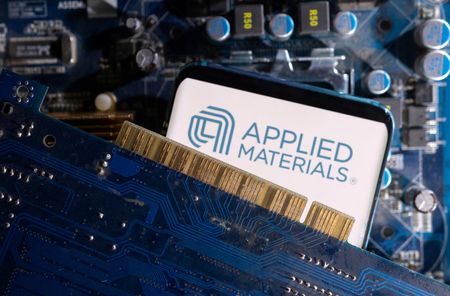 1
1 1
1
By Jaspreet Singh and Max A. Cherney
(Reuters) -Semiconductor equipment maker Applied Materials on Thursday forecast its fourth-quarter profit would be substantially higher than analyst estimates, as chip demand picks up and governments spend billions on subsidies.
Shares jumped 1.9% in extended trading after the company also posted better-than-expected third-quarter earnings.
Governments across the globe have given billions of dollars in subsidies in the past year to boost domestic semiconductor production, which benefited Applied and rivals such as Lam Research and KLA whose tools are essential in chip making.
The government incentives total hundreds of billions of dollars globally over the next five years, Applied chief executive Gary Dickerson said in the earnings conference call on Thursday.
Applied expects fourth-quarter revenue of $6.51 billion, plus or minus $400 million, substantially higher than the average analyst estimate of $5.86 billion.
The Santa Clara, California-based company forecast adjusted profit per share between $1.82 and $2.18, topping the market estimate of $1.61.
Applied reported third-quarter revenue of $6.43 billion, beating analysts’ average estimate of $6.16 billion, according to Refinitiv data.
On an adjusted basis, it earned $1.90 per share in the quarter ended July 30, beating estimates of $1.74.
Applied finance chief Brice Hill said that despite overall lower chip equipment spending this year, the company’s services business would continue to grow.
For its company’s semiconductor systems unit, which supplies gear to chip makers, third-quarter revenue slipped roughly 1% to $4.68 billion.
Applied’s lucrative services unit, which collects revenue from keeping the tools running at maximum capacity with consulting and spare parts, ticked up 3% to $1.46 billion.
Sales in its display segment fell 29% to $235 million in the quarter.
Applied and the other tool makers initially were hurt by a batch of U.S. export controls restricted the sale of the most advanced gear to Chinese customers. But in recent months they have benefited from customers in China increasing purchases of equipment that is capable of older manufacturing processes.
Samsung Electronics, Taiwan Semiconductor Manufacturing Co, and Intel Corp use the company’s advanced chip production tools.
(Reporting by Jaspreet Singh in Bengaluru and Max A. Cherney in San Francisco; Editing by Shinjini Ganguli, David Gregorio and Jamie Freed)